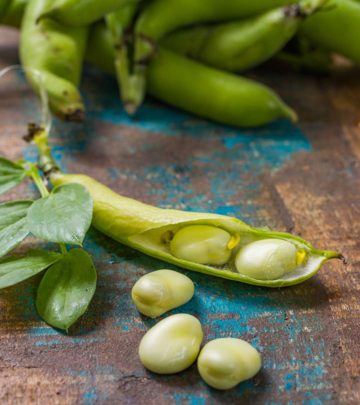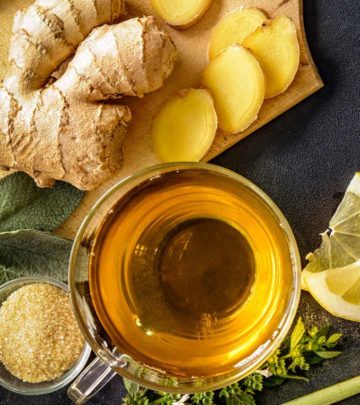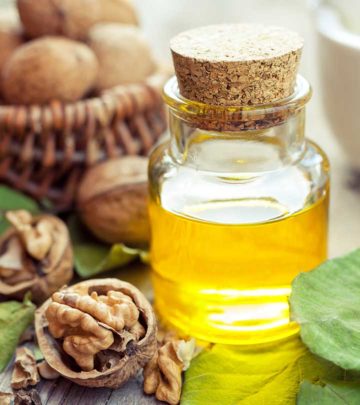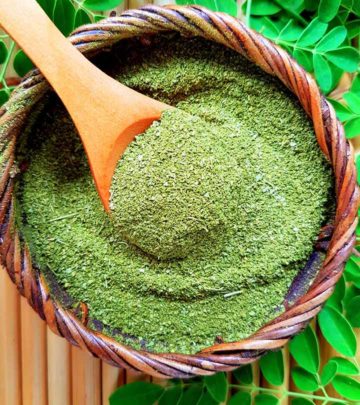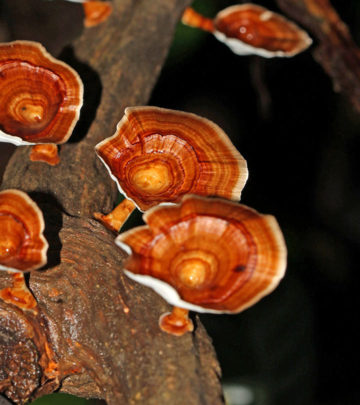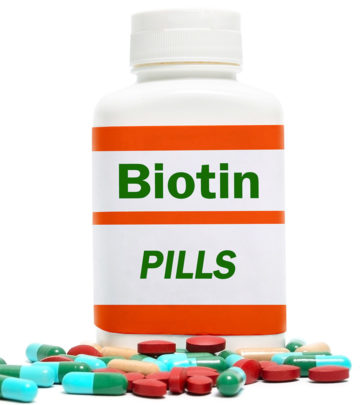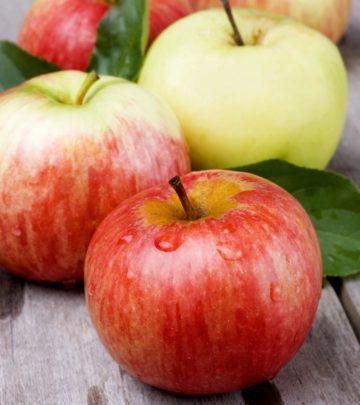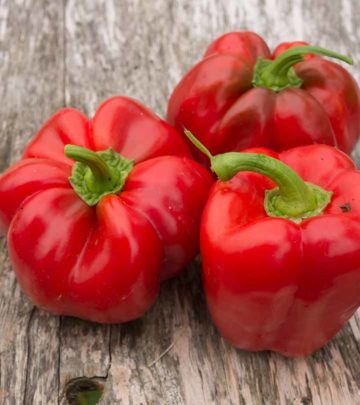How To Use Apple Cider Vinegar For Eczema
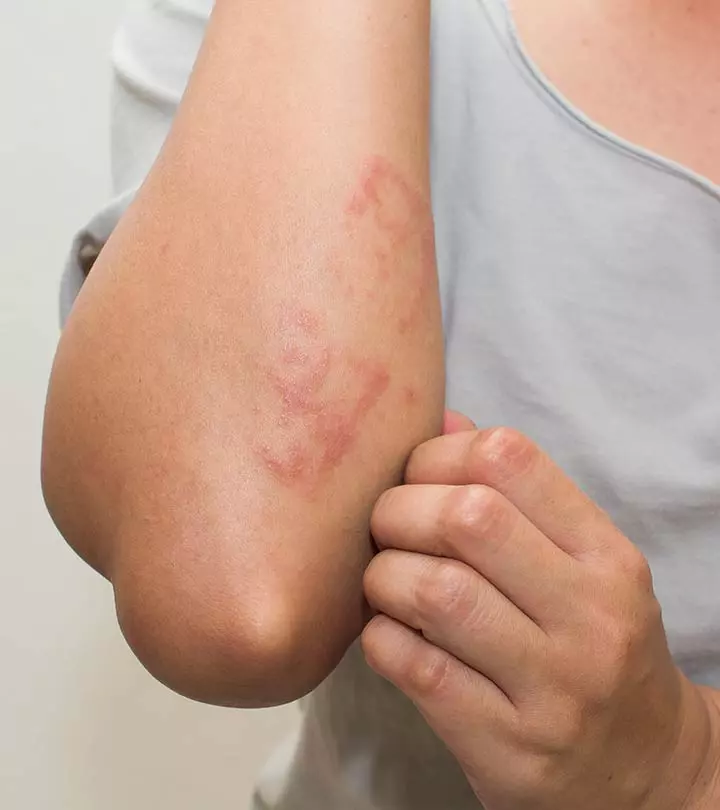
Image: ShutterStock
One doesn’t need to explain how tormenting eczema can be. Both physically and emotionally. If you are fighting this condition, we understand you.
And we know it isn’t easy. You might have to deal with the ordeal several times in a day. It can get quite embarrassing as well, right?
We understand. Which is why we have something for you.
All those medications and creams are okay. But there could be something you haven’t tried yet.
Apple cider vinegar for eczema. Yes. Trust us when we say that it works wonders.
Because it does.
In This Article
Eczema – A Brief
Eczema is a skin condition where certain areas on the skin turn into inflamed, itchy, and rough patches. The condition might also lead to blisters.
Eczema can affect almost any part of the body, but it most commonly occurs on the face, wrists, hands, the back of the knees, and feet. It can affect skin pigmentation, making the affected area lighter or darker.
The cause of the disease is unknown, although most medical experts believe that it is caused by an overactive immune system when it responds to an irritant.
And, by the way, there might not be a complete cure for the condition. But one can manage it quite effectively with the use of medications and by avoiding irritants. And by using apple cider vinegar.
How? Which is what we will see now.
Does Apple Cider Vinegar Work For Eczema?
Is apple cider vinegar good for eczema? That’s the big question. The internet says so. Your neighbor says so. But what is the truth?
Apple cider vinegar does help in treating eczema. And here’s how it does that.
- Apple cider vinegar is rich in compounds like riboflavin, vitamins, enzymes, and mineral salts – all of which improve skin health.
- The vinegar is also rich in fiber that enhances the digestive system and makes it easy to flush toxins out of the body. This can help one manage eczema.
- It also acts as an astringent, thereby removing bacteria, oil, and other impurities from the skin.
- It is a good source of potassium, a mineral that helps one deal with allergic conditions like eczema.
- The anti-inflammatory properties of the vinegar help soothe the skin and give relief.
- The acetic, lactic, and malic acids possess antimicrobial and antiseptic properties that help fight skin infections causing eczema.
[ Read: How To Make Apple Cider Vinegar At Home ]
And now, we get to the ways you can use apple cider for eczema treatment.
How To Use Apple Cider Vinegar For Eczema?
Here are 6 effective ways of treating eczema with apple cider vinegar.
1. Diluted Apple Cider Vinegar
What You Need
1 small cup each of apple cider vinegar and water
Directions
- Mix equal quantities of apple cider vinegar and water in a bowl. If you have sensitive skin, you can add 1/4 cup of the vinegar to 3 cups of water.
- Using a cotton ball, apply the solution directly to the affected area.
- You can also add the mixture to a spray bottle and spritz on the affected area.
- You can use this remedy twice a day, preferably once in the morning and once at night. Repeat for several days until you notice a visible difference.
2. Apple Cider Vinegar Bath For Eczema
What You Need
2 cups of apple cider vinegar
Directions
- Mix the 2 cups of apple cider vinegar in your bath or tub. If it’s for a baby tub, you can use 4 teaspoons of the vinegar for every 3 1/2 liters of water.
- Soak in the bath for about 30 minutes. If it’s a child, you can help him soak in the bath with the help of toys.
- Pat the skin dry gently with a soft cotton towel until it is slightly moist.
- Moisturize your skin immediately with an eczema moisturizer.
- Wear loose clothes to avoid itching.
- Repeat this 3-4 times a week for best results.
[ Read: Apple Cider Vinegar For Treating Psoriasis ]
3. Apple Cider Vinegar Liquid
What You Need
- 1 tablespoon of apple cider vinegar
- 30 ml of lukewarm water
- Blackstrap molasses or honey (as required)
Directions
- Dilute the apple cider vinegar in the water.
- You can add the molasses or honey to the mixture to enhance its taste.
- Mix thoroughly, and take the mixture thrice a day. You need to take it at least 30 minutes before eating.
- Moisturize your skin after this to prevent apple cider vinegar from drying out your skin.
4. Apple Cider Vinegar With Baking Soda
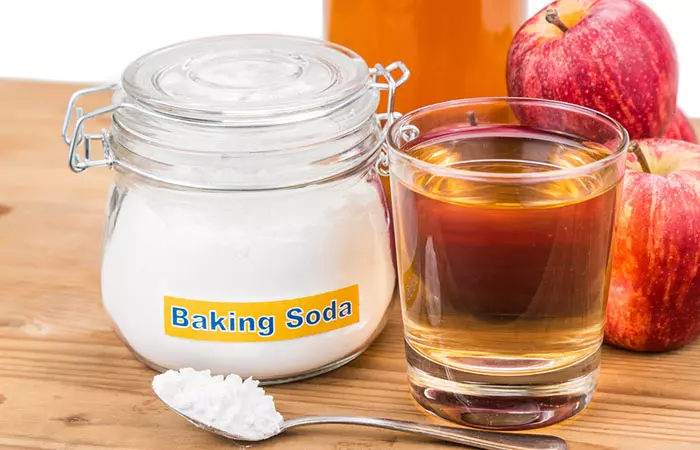
What You Need
- 1/4 teaspoon of baking soda
- 2 tablespoons of apple cider vinegar (organic)
- 1/2 cup of water
- A little bit of honey
Directions
- Add the baking soda and apple cider vinegar to half a cup of water. Mix well. You will see a little fizz.
- Once the fizz has stopped, add the honey.
- Stir thoroughly. Drink this solution once a day, regularly, till you see the results.
[ Read: Ways To Use Vinegar For Your Skin ]
5. Fizzy ACV Tea
What You Need
- 2 tablespoons of apple cider vinegar
- 1/4 teaspoon of baking soda
- 1/2 cup of water
- Tea powder (as required)
Directions
- Add the apple cider vinegar to an empty cup. To this, add the baking soda.
- Mix well and let it rest for a while. You will see the fizz.
- Once the fizz disappears, add half a cup of water and mix thoroughly.
- Now, add the tea and mix again.
- You can take the tea once every morning.
Though the tea might be a little hard to drink at first, it offers a lot of relief.
6. Apple Cider Vinegar In The Laundry
What You Need
1/2 cup of white distilled apple cider vinegar
Directions
- Once you have added your clothes to the washing machine, add the white distilled apple cider vinegar.
- Ensure you don’t mix vinegar and bleach. It produces toxic fumes.
The vinegar acts as a natural fabric softener. It is way better than soaps and detergents, whose residue on the clothes might cause irritation and even eczema outbreaks.
Those were a few ways you could use apple cider vinegar for eczema relief. And now, there is something else – something most of us don’t know. There is another type of eczema..
[Read : Apple Cider Vinegar Side Effects]
Dyshidrotic Eczema
Also called dyshidrosis, this is a skin condition that causes blisters to develop on the soles of the feet and palms of the hands. These blisters are usually filled with fluid and are itchy, and they might last up to two to four weeks.
The causes of this condition are unknown. But some experts believe it could be caused by certain seasonal allergies like hay fever.
You might be at risk of developing this condition if you have high levels of stress (this could be physical or emotional) or have other allergies. Also, if your hands and feet are often moist or inside water – or if you are frequently exposed to metal salts like chromium, nickel, and cobalt – you have higher chances of developing dyshidrotic eczema.
The most common symptom of dyshidrotic eczema is the formation of blisters on the fingers, toes, hands, and feet. At times, there would be large blisters that can be very painful. And when the blisters dry up, they might turn into cracks, causing more pain.
The diagnosis of the condition is pretty simple. Your doctor might run you through certain tests – as the symptoms of this condition could be similar to that of other skin ailments. The most popular of the tests is the skin biopsy, which involves the removal of a small patch of skin for testing in the lab. This test zeroes in on what the condition exactly is.
There are numerous ways to treat this type of eczema. They include the application of a corticosteroid cream (for mild outbreaks) and a corticosteroid injection (for severe outbreaks). There are other treatment methods, like UV light treatments, anti-itch creams, immune-suppressing ointments, etc.
And then, we have apple cider vinegar. But wait – is it the same as white vinegar? And if there is a difference, which of the two works best for eczema?
White Vinegar For Dyshidrotic Eczema?
The actual apple cider vinegar is the acidic variety. But it is unfiltered and unpasteurized and contains the ‘mother’ – and hence is far more nutritious. The white vinegar, on the other hand, is filtered – it is less acidic, but is less nutritious as well.
Coming to treating dyshidrotic eczema, the actual apple cider vinegar works best. But since it is more acidic, it is always advisable to dilute it before using it. And coming to the usage, you can use it to treat dyshidrotic eczema the same way you use it to treat normal eczema.
Tips To Use Apple Cider Vinegar
- Ensure the vinegar is cloudy and dark, with the sediment at the bottom of the container.
- Remember to dilute the vinegar before using it. This point holds special importance when you are using it to treat eczema in children. This can help prevent burning or a stinging sensation in children.
- Avoid using the vinegar if you are pregnant.
- If you are suffering from peptic ulcers, chronic indigestion or heartburn, don’t take apple cider vinegar.
- If you are on diabetes medication, don’t take ACV – as it might react with insulin.
- Most importantly, if you have a preexisting medical condition, consult your doctor before you take apple cider vinegar.
Yes, using apple cider vinegar for eczema treatment is very effective. But how about preventing the condition altogether? That’s much better, isn’t it?
Foods To Prevent Eczema Outbreaks
It’s simple common sense. Eczema is basically a form of inflammation. So, eating foods with anti-inflammatory properties can seal the deal. These include foods containing omega-3 fatty acids – fatty fish like salmon or mackerel or even an omega-3 supplement (1).
Foods containing quercetin (a plant-based flavonoid) also help. These include apples, cherries, broccoli, blueberries, and spinach.
And then, we have foods containing probiotics. These include yogurt, naturally fermented pickles, kefir, etc.
Another set of superfoods for eczema are the ones rich in vitamin C. These include kiwis, baked potatoes, tomatoes, Brussels sprouts, and red bell peppers.
Also, try replacing fatty red and processed meats with lean meats. These include extra lean ground beef, duck, lamb, and pork.
Now you know how to treat eczema with apple cider vinegar. Not just this – you can also manage eczema through some simple lifestyle changes. These are natural methods that work great for most.
How To Manage Eczema Naturally
- Firstly, figure the triggers. What triggers a flare-up in one individual may not do so for someone else. Try different types of clothing and foods – maintain a diary and note down the triggers. Yes, this will take a while as it involves some work, but it’s worth it.
- Clothes play a major role. You might have figured out what kind of clothing suits you. But it may not be as beneficial if you wear clothing that irritates you. Loose clothing works. Always.
- Non-irritating shampoos and soaps are a must. You need to avoid products that contain parabens or sodium lauryl sulfate.
- Use a humidifier. A dry environment can aggravate eczema and other similar skin conditions. You can invest in an air humidifier that adds moisture to the air, and ultimately, to your skin.
- Keep your house clean, please. This is basic. Dust mites, pet dander, molds, dandruff, etc. – none of these have a place in your home. This is imperative whether you suffer from eczema or not.
- Minimize stress. Yes. Stress doesn’t seem like much, but mind you, it kills. Meditate. Develop a positive mental attitude. Relax and unwind. Work might be worship – but that ain’t possible if you aren’t healthy.
- And as we have already discussed, improve your diet. Simply put, eat healthy. Stay away from junk. Eat what is good for your body, and your body will thank you later. Also, cut gluten from your diet – as it might trigger your skin condition.
There are certain other ways you can prevent eczema flare-ups.
- Avoid stress or overeating (2).
- Avoid abrupt changes in the temperature or humidity.
- Moisturize often.
- Avoid scratchy materials like wool.
Okay. It’s time for some hope. No matter how bad your condition is, there will always be something available that can make your life normal. In this case, it is apple cider vinegar. Include it in your routine and see the results.
You will be filled with wonder.
Let us know how this post on drinking apple cider vinegar for eczema has helped you. Do comment in the box below.

Community Experiences
Join the conversation and become a part of our vibrant community! Share your stories, experiences, and insights to connect with like-minded individuals.


